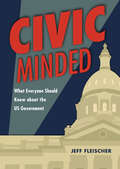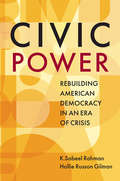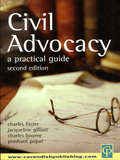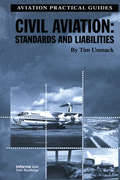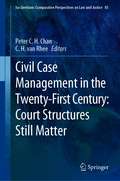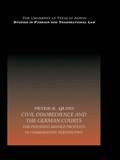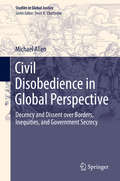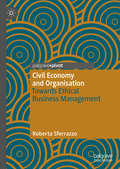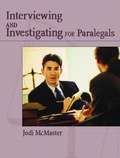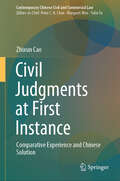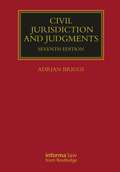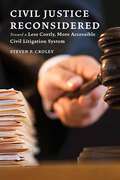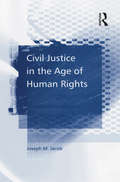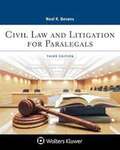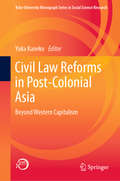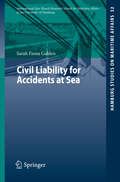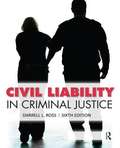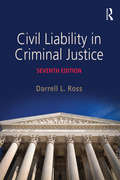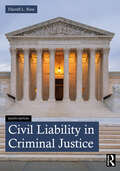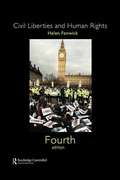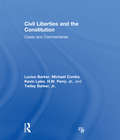- Table View
- List View
Civic Education in Polarized Times: NOMOS LXVI (NOMOS - American Society for Political and Legal Philosophy #38)
by Eric Beerbohm Elizabeth BeaumontReveals the possibilities and challenges of civic education in circumstances of extreme polarization, and how civic learning and political divisiveness can interact and influence each otherAs fears about polarization—and its contribution to democratic crisis and corrosion—rise, many people have posited civic education as a possible remedy. In a time of increasing political polarization, what should the goals of civic education be, and how should they be implemented? In the latest installment of the NOMOS series, Eric Beerbohm and Elizabeth Beaumont bring together a distinguished group of interdisciplinary scholars across philosophy, politics, and law, inviting us to think deeply about the complex promises and pitfalls of civic education.Contributors raise a variety of crucial considerations not only about how to educate citizens in a polarized era but also for a polarized era. What types of civic learning hold promise for preparing students to navigate their way through a political landscape of escalating hostile factions, distrust, truth decay, and disagreement about basic facts? Could or should civic education attempt to reduce or counteract polarization, or should it focus on other aims?Beaumont and Beerbohm show us that the dynamics and circumstances of polarization do not stop at the schoolhouse gates, but bring new urgency together with added pressures and constraints to all civic education. As political polarization continues to intensify across the globe, this riveting volume illuminates the significance, the possibilities, and the challenges of civic education in the contemporary era.
Civic Minded: What Everyone Should Know about the US Government
by Jeff FleischerHow do student loans work? What do sanctions do? Where does federal spending go, and who decides on the budget? Author and established journalist Jeff Fleischer digs into these and other relevant civics topics to explain the history behind different processes and programs, what they look like today, and why it’s important to understand them. Through engaging, well-researched text and related sidebars, this book will help you understand and join many ongoing political conversations in the US, from spending to citizenship to international relations and more.
Civic Power: Rebuilding American Democracy in an Era of Crisis
by K.Sabeel Rahman Hollie Russon GilmanWhat will it take to restore American democracy and rescue it from this moment of crisis? Civic Power argues that the current threat to US. democracy is rooted not just in the outcome of the 2016 election, but in deeper, systemic forms of inequality that concentrate economic and political power in the hands of the few at the expense of the many. Drawing on historical and social science research and case studies of contemporary democratic innovations across the country, Civic Power calls for a broader approach to democracy reform focused on meaningfully redistributing power to citizens. It advocates for both reviving grassroots civil society and novel approaches to governance, policymaking, civic technology, and institutional design - aimed at dismantling structural disparities to build a more inclusive, empowered, bottom-up democracy where communities and people have greater voice, power, and agency.
Civil Advocacy: A Practical Guide
by Charles Foster Jacqueline Gillatt Charles Bourne Popat PrashantThis book is a practical guide to practice and procedure in courts and tribunals. It is aimed at the recently qualified practitioner,pupil barristers, trainee solicitors, or lawyers unversed in advocacy and procedure. It provides a guide to applications in most areas of the law, with brief discussions of the relevant law, rules of procedure and practical tips. The applications covered are those which practitioners are likely to encounter in their first years of practice. In addition, each chapter attempts to anticipate likely pitfalls, with suggested solutions. The court system and techniques of advocacy are also covered. This is not a legal textbook, and provides no substitute for legal research. It is designed to be starting point for advocates faced with an unfamiliar task.
Civil Aviation: Standards and Liabilities (Aviation Practical Guides)
by Tim UnmackThis volume looks at the operational standards and obligations in civil aviation, and the consequences of failure to comply with them. It covers a wide range of topics both international and complex in measure.
Civil Case Management in the Twenty-First Century: Court Structures Still Matter (Ius Gentium: Comparative Perspectives on Law and Justice #85)
by Peter C. H. Chan C. H. van RheeThe information age provides novel tools for case management. While technology plays a crucial role, the way in which courts are structured is still critical in ensuring effective case management. The correlation between court structure and case management is a pivotal topic. The existing debate concentrates predominantly on the micro and case-specific aspects of case management, without further inquiry into the relationship between court structure, court management, and case management. The contributions within this volume fill this gap from a comparative perspective, undertaking a macro/structural and sub-macro perspective of procedure and case management.
Civil Disobedience and the German Courts: The Pershing Missile Protests in Comparative Perspective (UT Austin Studies in Foreign and Transnational Law)
by Peter E. QuintIn the 1980s the West German Peace Movement -- fearing that the stationing of NATO nuclear missiles in Germany threatened an imminent nuclear war in Europe -- engaged in massive protests, including sustained civil disobedience in the form of sit-down demonstrations. Civil Disobedience and the German Courts traces the historical and philosophical background of this movement and follows a group of demonstrators through their trials in the German criminal courts up to the German Constitutional Court -- in which their fate was determined in two important constitutional cases. In this context, the volume also analyzes the German Constitutional Court, as a crucial institution of government, in comparative perspective. The book is the first full-length English language treatment of these events and constitutional decisions, and it also places the decisions at an important turning-point in German constitutional history.
Civil Disobedience in Global Perspective: Decency and Dissent over Borders, Inequities, and Government Secrecy (Studies in Global Justice #16)
by Michael AllenThis book explores a hitherto unexamined possibility of justifiable disobedience opened up by John Rawls' Law of Peoples. This is the possibility of disobedience justified by appeal to standards of decency that are shared by peoples who do not otherwise share commitments to the same principles of justice, and whose societies are organized according to very different basic social institutions. Justified by appeal to shared decency standards, disobedience by diverse state and non-state actors indeed challenge injustices in the international system of states. The book considers three case studies: disobedience by the undocumented, disobedient challenges to global economic inequities, and the disobedient disclosure of government secrets. It proposes a substantial analytical redefinition of civil disobedience in a global perspective, identifying the creation of global solidarity relations as its goal. Michael Allen breaks new ground in our understanding of global justice. Traditional views, such as those of Rawls, see justice as a matter of recognizing the moral status of all free and equal person as citizens in a state. Allen argues that this fails to see things from the global perspective. From this perspective disobedience is not merely a matter of social cooperation. Rather, it is a matter of self determination that guarantees the invulnerability of different types of persons and peoples to domination. This makes the disobedience by the undocumented justified, based on the idea that all persons are moral equals, so that all sovereign peoples need to reject dominating forms of social organization for all persons, and not just their own citizens. In an age of mass movements of people, Allen gives us a strong reason to change our practices in treating the undocumented. James Bohman, St Louis University, Danforth Chair in the Humanities This monograph is an important contribution to our thinking on civil disobedience and practices of dissent in a globalized world. This is an era where non-violent social movements have had a significant role in challenging the abuse of power in contexts as diverse, yet interrelated as the Arab Spring protests and the Occupy protests. Moreover, while protests such as these speak to a local political horizon, they also have a global footprint, catalyzing a transnational dialogue about global justice, political strategy and cosmopolitan solidarity. Speaking directly to such complexities, Allen makes a compelling case for a global perspective regarding civil disobedience. Anyone interested in how the dynamics of non-violent protest have shaped and reshaped the landscape for democratic engagement in a globalized world will find this book rewarding and insightful. Vasuki Nesiah, New York University
Civil Economy and Organisation: Towards Ethical Business Management
by Roberta SferrazzoThis book aims to move beyond the concepts of 'bureaucracy', 'hierarchical control' and 'performance' that classic organizational and managerial studies often focus upon. Instead, it considers these managerial leverages as instruments that are liable to lead to a decline in positive worker behaviors. It proposes a shift from traditional management towards a type of organization based upon self-control, equality and liberation - a model far better suited to the turbulent business environment of today. In order to support this analysis, it draws on interdisciplinary research, including the Italian Civil Economy tradition, the connection between agapic love and leadership, and philosophical perspectives on management. It will be of interest to scholars working in the fields of management studies, philosophy, organisation studies and business ethics.
Civil Interviewing And Investigation For Paralegals: A Process-Oriented Approach
by Jodi G. McmasterSynthesizing the theoretical with the practical, this book presents topics in the same order in which they would be encountered in the real world. Assuming knowledge of core areas of law, and civil litigation, the book walks the reader through the steps of the trial process, outlining the practical steps, and introducing the evidentiary concepts that accompany each item that must be investigated as they unfold. For practicing paralegals and law clerks, and those studying to become a paralegal.
Civil Judgments at First Instance: Comparative Experience and Chinese Solution (Contemporary Chinese Civil and Commercial Law)
by Zhixun CaoThis book provides an in-depth discussion and introduction to Chinese civil procedure from both a theoretical and practical perspectives, as well as a comparative study of its relevant systems with those of the West. The subject matter of this book is Chinese civil judgments. Judgments, as the final judicial product which affects the legal relationship between both parties or even multiple parties, provide a desirable objects to observe and evaluate the service of judicial proceedings and the protection of the parties’ procedural rights. And since judgments are in most cases regarded as the default termination of any civil litigation, there is no need to argue for a comparative study on this topic which has already inspired Chinese doctrines and newest reforms. One of the aims of such research is to modernize Chinese civil justice considering the experience of leading legal counterparts. Next to the theoretical analysis, this book introduces empirical data in China to the English literature, which could provide a vivid illustration for legal researchers to be better informed about the Chinese legal system and its real version of rule of law. In other words, this book likes to describe the real judicial practice in China and summarize how Chinese lawyers understand and facilitate the production of civil judgments. Moreover, this book intends to focus on the adjudicative techniques in the civil litigation, which should constitute the mutual basis of most civil justice. Even there is no well-developed theory under the name of “Adjudicate Techniques” in some jurisdictions, it is not uncommon to discover some principles, methods, institutions, and practical operation, which is functionally and substantially comparable to the ones in other civil justice systems.
Civil Jurisdiction and Judgments (Lloyd's Commercial Law Library)
by Adrian BriggsNow in a fully updated seventh edition, this book remains an established treatise in the field of civil jurisdiction and judgments. It aims to make a full and complete statement of English law on civil jurisdiction and the effect of foreign judgments against the backdrop of significant uncertainty about the consequence of Brexit on the law of civil jurisdiction and judgments. The book looks in detail at: the law after the Brussels Regulation has ceased to operate as part of English law; the substance of the Lugano Convention, which the government hopes to join; the incorporation of the 2005 Hague Convention on Choice of Court Agreements into English law, and developments in the common law rules of jurisdiction, injunctions, and foreign judgments. This text aims to be an authoritative and comprehensive reference for all legal practitioners working in commercial law across jurisdictions as well as the judiciary.
Civil Justice Reconsidered: Toward a Less Costly, More Accessible Litigation System
by Steven P. CroleyProsecutes the civil litigation system and proposes practical reforms to increase access to the courts and reduce costs.Civil litigation has come under fire in recent years. Some critics portray a system of dishonest lawyers and undeserving litigants who prevail too often, and are awarded too much money. Others criticize the civil justice system for being out of reach for many who have suffered real injury. But contrary to these perspectives and popular belief, the civil justice system in the United States is not out of control. In Civil Justice Reconsidered, Steven Croley demonstrates that civil litigation is, for the most part, socially beneficial. An effective civil litigation system is accessible to parties who have suffered legal wrongs, and it is reliable in the sense that those with stronger claims tend to prevail over those with weaker claims. However, while most of the system’s failures are overstated, they are not wholly off base; civil litigation often imposes excessive costs that, among other unfortunate consequences, impede access to the courts, and Croley offers ways to reform civil litigation in the interest of justice for potential plaintiffs and defendants, and for the rule of law itself.A better litigation system matters only because of what is at stake for real people, and Civil Justice Reconsidered speaks to the thought leaders, litigation reformers, members of the bar and bench, and policymakers who can answer the call for reforming civil litigation in the United States.
Civil Justice in the Age of Human Rights
by Joseph M. JacobThe end of the last century witnessed two major events in the field of civil justice: the Civil Procedure Rules (CPR) came into force and the Human Rights Act (HRA) gave effect to the European Convention on Human Rights. This volume assesses the effect of the Act and attempts to reconcile the expediency and efficiency essential to modern civil justice with the need for recognition of human dignity and equality inherent to human rights. The book is primarily concerned with the effects of the HRA on civil procedure and, in particular, the effects on the CPR. It examines the view that the new civil procedure regime could be susceptible to HRA challenges. More specifically, the work discusses whether there are differences between the CPR and the ECHR ideas of what constitutes a fair trial or just decision and between their views of proportionality. The study notes the differences between common and civil law and discusses whether there is any coming together with other European systems. This book will be a valuable resource for academics and researchers as well as lawyers and judges with an interest in the practical implications of the HRA.
Civil Justice, Privatization, and Democracy
by Trevor C.W. FarrowPrivatization is occurring throughout the public justice system, including courts, tribunals, and state-sanctioned private dispute resolution regimes. Driven by a widespread ethos of efficiency-based civil justice reform, privatization claims to decrease costs, increase speed, and improve access to the tools of justice. But it may also lead to procedural unfairness, power imbalances, and the breakdown of our systems of democratic governance. Civil Justice, Privatization, and Democracy demonstrates the urgent need to publicize, politicize, debate, and ultimately temper these moves towards privatized justice.Written by Trevor C.W. Farrow, a former litigation lawyer and current Chair of the Canadian Forum on Civil Justice, Civil Justice, Privatization, and Democracy does more than just bear witness to the privatization initiatives that define how we think about and resolve almost all non-criminal disputes. It articulates the costs and benefits of these privatizing initiatives, particularly their potential negative impacts on the way we regulate ourselves in modern democracies, and it makes recommendations for future civil justice practice and reform.
Civil Law And Litigation For Paralegals (Aspen College)
by Neal R. BevansCivil Law and Litigation for Paralegals is a comprehensive text designed specifically for paralegal civil litigation courses. Author Neal Bevans not only teaches the basics of civil litigation, but also gives students the opportunity to learn skills they will use in practice. In a balanced approach, Bevans covers all the key topics paralegals need to know in an easy-to-read and engaging style that utilizes numerous examples and illustrations but never overwhelms the student. The text provides students with an in-depth analysis of a wide variety of civil cases, beginning with laying out the basic foundation of the American legal system. It proceeds through the investigation and implementation of a civil case, and follows the case through to appeal. The text balances the theoretical underpinnings of the law with the practical examples and hands-on experience that all students need to completely understand the topic. The helpful pedagogy throughout the book and a comprehensive teaching package make class preparation as easy as possible.
Civil Law Reforms in Post-Colonial Asia: Beyond Western Capitalism (Kobe University Monograph Series in Social Science Research)
by Yuka KanekoThis book focuses on the legal systems of the late-developing countries of ASEAN (Cambodia, Laos, Myanmar, and Vietnam, often referred to as the CLMV countries). These nations are apt to be placed in an economically disadvantageous situation within the opportunity of communalization of legal systems being advanced by the ASEAN Economic Community (AEC) launched in 2015, and the book clarifies the dynamics of the changes within these legal systems. Concurrently, there is an intention to analyze the “legal system development support” that has continued to be provided to these countries since the mid-1990s via international development support from international organizations and developed countries including Japan. In particular, the emphasis has been on the area of civil law, where the main subject of Japan’s support has been centered on the civil code and civil procedure code. The legal system of the recipient country is complicated by the crisscrossing of the remnants of previous eras, from the inherent laws that have existed since before colonization, the laws of the colonial powers that were introduced during the colonial era (French law in Cambodia, Laos, and Vietnam; English law in Myanmar), the influence of socialist law after independence from colonization, and the path of modern industrialization and development, such that one country's legal system is the combination of all of these influences. For the reader to understand the dynamics of these changing laws, each chapter of the book combines two methodological perspectives. The first is to ascertain the spatial range as to how far the civil law extends across social phenomena. The second is a historical perspective in which the trends in legal changes will be understood on a time axis.
Civil Liability and Financial Security for Offshore Oil and Gas Activities
by Michael FaureCivil Liability and Financial Security for Offshore Oil and Gas Activities provides insights into the liability and compensation regime for offshore-related damage. The book analyses the legal regime in a variety of states (including the US and the UK) as well as the EU regime. In addition, the various compensation mechanisms and amounts available today to compensate offshore-related damage are described and critically analysed. Moreover, the book is based on in-depth interviews with a wide variety of relevant stakeholders including insurers, representatives from supervisory authorities, and oil and gas producers. This volume also provides a variety of policy recommendations, formulated to provide an optimal compensation regime for offshore-related damage.
Civil Liability for Accidents at Sea (Hamburg Studies on Maritime Affairs #32)
by Sarah Fiona GahlenThis book presents a study on civil liability for accidents at sea, with a focus on the interests of parties that are not contractually participating in the maritime enterprise. Shipping and the maritime offshore industry are among the most international businesses in the world, and the operation of ships and facilities at sea can involve very different interests in a wide variety of relationships. Although there is an international legal framework that covers the most frequent types of cases, questions remain regarding the interplay of international and national legislation. Addressing those questions, the first part of this study analyses the rules and the limits of international regulation applicable at sea, namely regarding compensation for pollution damage. The second part focuses on the jurisdictional rules and conflict-of-law rules that may be used to deal with cases beyond the scope of international legislation, in accordance with the law of the sea.
Civil Liability in Criminal Justice
by Darrell L. RossInvestigating Deaths in Custody and Officer-Involved Shootings addresses the critical investigation components from an expert witness perspective, providing the insights necessary to ensure a complete investigation. Investigating a custodial death or an officer involving a shooting presents unique and complex issues. When the deaths occur in the custody of the law enforcement agency, the investigator must be prepared to respond to emerging issues focused at his/her own agency or at another local agency. Conducting a thorough investigation is important because estate, community, judicial, agency, involved officer, and public policy interests are all at stake. These types of deaths present various emerging medical, psychological, legal and liability, technical, and investigatory issues that must be addressed through a comprehensive investigation. This is a timely topic as unrest over officer-involved shootings and deaths in custody take center stage conversations about policing and the criminal justice system. This book is ideal for students in criminal investigation, death investigation, crime scene investigation, and special topics in custodial deaths and officer-involved shootings, as well as death investigators, law enforcement officers, police administrators, and attorneys.
Civil Liability in Criminal Justice
by Darrell L. RossThe increasing litigation against criminal justice practitioners in the United States poses a significant problem for law enforcement and other personnel. Law enforcement and corrections professionals need to have a working knowledge of both criminal law and the civil law process to ensure that they are performing their duties within the limits of the law.?Civil Liability in Criminal Justice, 7th?Edition, provides valuable information and recommendations to current and future officers and correctional system employees, introducing them to civil liability and federal law, as well as recommending strategies that can be taken to minimize risks. Civil Liability in Criminal Justice?is unique in its combination of applicable case law and related liability research, while still providing an overview of current case law in high-liability areas. This new edition, revised to include?up-to-date United States Supreme Court cases, including liability trends on the use of force, arrest-related deaths, custodial suicides in detention, qualified immunity, and the outcomes of the Department of Justice and the application of Section 14141, additional context for liability issues, and extended coverage of collective bargaining and public perception, is a valuable resource for enhancing student knowledge and practitioner job performance. The text is suitable for undergraduate and graduate courses in Criminal Justice programs as well as for in-service and academy training. Ross offers an engaging, accessible introduction to this aspect of the US criminal justice system.
Civil Liability in Criminal Justice
by Darrell L. RossThis book provides valuable information and recommendations for current and future officers and correctional system employees, introducing them to civil liability and federal law, as well as recommending strategies that can be taken to minimize risks. The increasing litigation against criminal justice practitioners in the United States poses a significant problem for law enforcement and other personnel. Law enforcement and corrections professionals need to have a working knowledge of both criminal law and the civil law process to ensure that they are performing their duties within the limits of the law. Civil Liability in Criminal Justice is unique in its combination of applicable case law and related liability research, providing an overview of high-liability areas. This new edition has been revised to include up-to-date United States Supreme Court cases and illuminates the latest developments in the use of force, arrest-related deaths, custodial suicides in detention, collective bargaining, public perception issues, and more. Ross offers an engaging, accessible introduction to civil liability in the criminal justice system. A valuable resource for enhancing student knowledge and practitioner job performance, this text is suitable for undergraduate and graduate courses in criminal justice programs as well as for in-service and academy training.
Civil Liberties and Human Rights
by Helen FenwickMore than merely describing developments in the field of civil liberties and human rights, this comprehensive and challenging textbook provides students with detailed and thought-provoking coverage and analysis of the impact of the Human Rights Act 1998 in an era in which human rights are coming increasingly under pressure. Extensively re-written and updated since the last edition, here Helen Fenwick considers the impact of the Human Rights Act 1998, paying particular attention to Labour legislation, especially in the fields of criminal justice and terrorism. This book: considers recent key domestic decisions in the post-Human Rights Act era, including Campbell, A and Others v Secretary of State for the Home Dept, Ghaidan v Mendoza, R(Gillan) v Commisioner of Police of the Metropolis contains a new chapter on important developments in counter-terrorism law - covering the Anti-Terrorism Crime and Security Act 2001 and the Terrorism Acts 2005 and 2006 analyzes key developments in the sphere of media freedom, including the impact of the Communications Act 2003, Pro-life Alliance and Campbell explores new developments in criminal justice, including the Serious and Organized Crime Act 2005 addresses the changes in the field of anti-discrimination law, including the Sexual Orientation Regulations 2003 and Equality Act 2006. This textbook is an essential resource for students studying the development of human rights and civil liberties in the early years of the twenty-first century.
Civil Liberties and the Constitution: Cases and Commentaries
by Kevin Lyles Lucius J Barker Michael Combs H W Perry, Jr. Twiley BarkerUpdated in a new 9th edition, this casebook explores civil liberty problems through a study of leading judicial decisions. It offers a reasonable sample of cases across a broad spectrum of rights and liberties. This book introduces groups of featured cases with in-depth commentaries that set the specific historical-legal context of which they are a part, allowing readers to examine significant portions of court opinions, including major arguments from majority, concurring, and dissenting opinions.
Civil Liberties and the Constitution: Cases and Commentaries Second Edition
by Lucius J. Barker Twiley W. BarkerIn the words of the authors, "this volume does not attempt to cover the wide range of concerns with respect to the study of civil rights and liberties. Rather, its central purpose is to provide, in a coherent fashion, a collation of leading Supreme Court cases that focus on particular topics. These cases are edited in such a way as to promote a general, rather than a technically legal, understanding of the issues involved."

